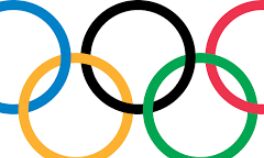To unite the world

The origins of the modern Olympics lie in the athletic competitions that were held in ancient Greece. The ancient Olympics held political, cultural and religious significance to the participating city-states. Often divided by politics and territorial disputes, the Greek city-states nevertheless united to commemorate the games. During such times, an Olympic Truce was declared to safeguard the passage of athletes. Even warring states felt inclined to pursue a more peaceful means of competition through shows of athletic prowess. As such it is noted that the ancient Olympics were grounds for fierce political and cultural battles with victory bringing more than simple pride and glory to the victor.
In modern times, however, there is a significant debate over the continuing relevance of the Olympic games. Its supporters credit the games as being events that bring nations together and they contribute significantly to the worldwide development of sports. The Olympics by their very nature are a symbol of multilateralism and equality in sports. Critics, however, point to the many challenges and growing costs of hosting such large scale events. Many experts have noted that the Olympics are not as lucrative as they are portrayed. The entire process involves massive spending, starting with the bid. Tokyo spent USD 75 million on its 2020 bid. Overall, it was reported in April by AP that the official cost of holding the 2020 Olympics was USD 12.6 billion and growing. Not only does the current cost far exceed the initial estimates, but it also continues to grow as the games were postponed till 2021. A Japanese news outlet estimated the additional cost of the delay at USD 2.7 billion to be spent over maintenance and logistics.
Additionally, news outlets have also reported that the enthusiasm amongst the Japanese public to hold such games during a continuing pandemic has thinned. An opinion poll by Kyodo news agency earlier in the year found that only 23 per cent of the people polled across Japan supported holding the games during the pandemic. The risks of holding such a large-scale, global event during a pandemic are significant after all. The solution, as many claimed, was a working vaccine. Now, in November, there is a chance for several working vaccines with recent announcements by Pfizer, Moderna and AstraZeneca. But, it must be noted that for now the Olympics committee has stated that athletes would not be mandated to get a vaccine shot before participation but it would be encouraged in good faith. International Olympic Committee president Thomas Bach said the priority for working vaccines should be the frontline workers battling the pandemic and that a vaccine was not the only hope of the Olympic organisers. For now, the general indication is that the Olympics cannot be allowed to jump the vaccine line for the limited quantity that would be available by July 2021. However, many have noted that such debates are still likely to continue and depending on how 'significant' the Olympics are seen to be, the world may decide to devote a small supply of vaccines for the athletes. As such, the IOC is in talks to discuss such a possibility with vaccine manufacturers, Regardless, the IOC has indicated that the Tokyo Olympics will be held in July, vaccine or no vaccine. Japan can simply not afford any more delays. Some estimates have now put the cost of holding the games at USD 25 billion which is still less than the Beijing Olympics 2008 or Sochi Winter Olympics 2014. The Olympic Minister Seiko Hashimoto has reasserted that the Olympics will be held at all costs next year.
While the continuation of sporting events worldwide has given some hope for the general procedure or organising such events, the Olympics organisers have gone so far as to indicate that it may even be possible for a limited number of spectators from the various nations to spectate the event in person. How this may be done without relying on vaccination solutions is yet to be fully announced. Regardless, as was the case with the ancient Olympics, the modern games, despite flaws, still hold great potential to unite the world in these divided times.



